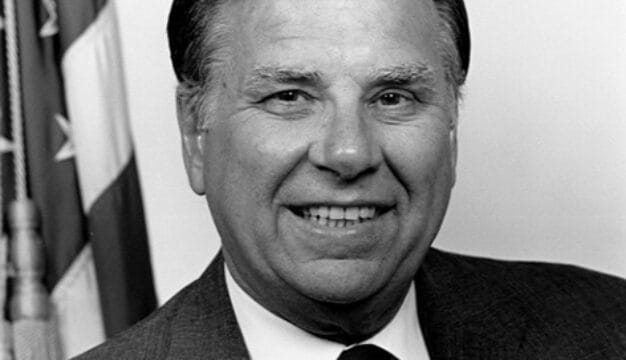Felix McConnell
Felix Grundy McConnell (1809-1846) was a noteworthy Jacksonian Democrat who held the distinction of being the first individual to represent Alabama’s Seventh Congressional District, from 1843 until his death in 1846. McConnell began his political career as a county clerk, served in both houses of the state legislature, and ultimately was elected to the U.S. Congress, where he introduced the first homestead bill. McConnell’s fondness for drinking, fighting, and playing pranks led to political difficulties but also made him popular with Alabama voters. His funeral was among the most well-attended of any Alabama statesman.
McConnell was born in Nashville, Tennessee, on April 1, 1809, to John and Martha McConnell. His family relocated to Fayetteville, Tennessee, in 1811. McConnell’s formal education in his youth was limited, and as a young man he found work as a saddler. In 1834, at the age of 25, McConnell moved to Talladega, Talladega County, where he built a log cabin and began to study law. The following year, he married Elizabeth Jennings Hogan, with whom he would have two sons and two daughters.
After passing the state bar in 1836, McConnell soon found his calling in Alabama politics. That same year, McConnell ran and won the position of clerk of the county court in Talladega. Additionally, McConnell served as postmaster for a time and organized the Talladega Literary Society, which promoted discussion on a range of intellectual topics, including law, theology, and politics. In 1838, he was elected to the Alabama House of Representatives as a Democrat and a year later was elected to the Alabama Senate, serving from 1839 to 1843. While serving in the state legislature, McConnell was criticized for voting in favor of state banking reform while he himself was in debt to the banks. He was also remembered for supporting legislation aimed at constructing penitentiaries in the state. His penchant for mischief also began to show itself, and he became a source of annoyance to his Whig opponents. A local historian noted that he once stole a speech belonging to a Whig colleague in order to get out of having to listen to it. After joining the Senate, McConnell continued to support banking reform as well as redrawing of districts to favor the Democratic Party.
 William P. Chilton
After the creation of the Seventh Congressional district following the 1840 U.S. Census, the popular McConnell set his sights on becoming its representative. At the time, the new district included large tracts of Alabama’s rural Black Belt region, but it underwent several evolutions prior to the setting of its modern boundaries. He was elected to two terms serving in the Twenty-eighth and Twenty-ninth Congresses from March 4, 1843, to his death on September 10, 1846. In his first contest for the seat, he faced William P. Chilton, a Talladega attorney and a former Whig legislator in the state house. McConnell bragged to Gov. Benjamin Fitzpatrick that his highly regarded wit, athleticism, and appearance (he was tall and by some accounts handsome) would allow him to easily secure the seat. When the votes were tallied though, his margin of victory proved to be fewer than 600 votes. While in Congress, McConnell became a reliable supporter of states’ rights, slavery, war with Mexico and the annexation of Texas, and policies that were viewed as favorable to the white working classes.
William P. Chilton
After the creation of the Seventh Congressional district following the 1840 U.S. Census, the popular McConnell set his sights on becoming its representative. At the time, the new district included large tracts of Alabama’s rural Black Belt region, but it underwent several evolutions prior to the setting of its modern boundaries. He was elected to two terms serving in the Twenty-eighth and Twenty-ninth Congresses from March 4, 1843, to his death on September 10, 1846. In his first contest for the seat, he faced William P. Chilton, a Talladega attorney and a former Whig legislator in the state house. McConnell bragged to Gov. Benjamin Fitzpatrick that his highly regarded wit, athleticism, and appearance (he was tall and by some accounts handsome) would allow him to easily secure the seat. When the votes were tallied though, his margin of victory proved to be fewer than 600 votes. While in Congress, McConnell became a reliable supporter of states’ rights, slavery, war with Mexico and the annexation of Texas, and policies that were viewed as favorable to the white working classes.
McConnell’s antics in both Alabama and Washington, D.C., made for a great deal of gossip, however, increasing both his popularity and infamy. For example, in 1843 he was thrown out of the National Theater in Washington, D.C., for loudly critiquing a performance by famed Norwegian violinist Ole Bull. The likely intoxicated McConnell was forcibly removed by a number of local police. Such outbursts aside, McConnell proved popular in the Congress for his ability to compromise and ease tensions with his wit. His jokes often produced so much laughter in the House that record keepers had difficulty transcribing the remarks. McConnell was an outspoken supporter of Irish independence and Irish patriot Daniel O’Connell and was once ruled out of order when he took to the floor to argue for U.S. annexation of Ireland.
McConnell’s behavior angered Democrats and Whigs alike back in his district, leading to an effort to deny him a second term. Local political leaders decided that if McConnell was not re-nominated by his party then local Whigs would not field a candidate of their own. Democrats then nominated Samuel Rice, who had been a member of the Alabama Legislature and was then-editor of the Democratic Watchtower; he would later serve as chief justice of the Alabama Supreme Court. Undeterred, McConnell ran anyway as an independent Democrat. The campaign was remembered as the “Bloody Seventh” and was considered by locals to be the most exciting race ever witnessed in the region. Rice enjoyed a reputation as a strong debater and attacked McConnell for his drinking and declared that even when sober, McConnell was unfit for duty. McConnell softened the blow by poking fun at his own failings while on the campaign trail. He labeled his opponent as untrustworthy and expressed regret that the district had only two bad characters to choose from and emerged as the overwhelming winner.
McConnell’s biggest legislative achievement while in Congress was sponsoring the first legislation aimed at donating new lands to settlers rather than selling it to business interests. Later known as homesteading, McConnell’s idea seems to have come from Tennessee hero Davey Crockett, who argued that the federal government would be better served by allowing land squatters to keep their claim if they were making good use of it instead of searching for buyers. McConnell championed the idea that 160 acres should be provided to any head of household who would cultivate the land. The concept was also embraced by early labor leaders, who believed the idea might encourage the urban poor to move out west, thereby decreasing the supply of unskilled labor in cities. In 1862, while the first Homestead Act was being debated, Sen. Andrew Johnson, one of the Act’s greatest champions, was forced to admit that Alabama congressman Felix McConnell had pushed for a similar bill first.
In 1846, the heavy drinking caught up with McConnell. Although he had once been a member of a temperance union, he was never able to maintain sobriety. McConnell did not return to Alabama at the end of that congressional session, citing business with the Bureau of Indian Affairs, often referred to at the time as the “Indian Office.” He paid a visit to Pres. James K. Polk, a family friend who had helped McConnell and his father gain postmaster appointments. Polk reported that he gave McConnell a loan of $100 and that McConnell appeared very ill. A few days later on September 10, McConnell was found dead with a slit throat and several stab wounds. The death was ruled a suicide caused by either alcohol-induced delirium or depression. Despite the reported loan, McConnell was not known to have been in financial difficulties. Owing to his warm relations with Polk and numerous other government figures, the president, members of his cabinet, Supreme Court justices, and fellow congressmen marched in his funeral procession. He was buried in Congressional Cemetery in Washington, D.C.
Further Reading
- Atkins, Leah. “Felix Grundy McConnell: Old South Demagogue.” Alabama Review 30 (April 1977): 83-100.
- Johnson, Dennis. The Laws That Shaped America: Fifteen Acts of Congress and Their Lasting Impact. New York: Routledge, 2009.
- Long, Kim. The Almanac of Political Corruption, Scandals, & Dirty Politics. New York: Random House, 2008.



